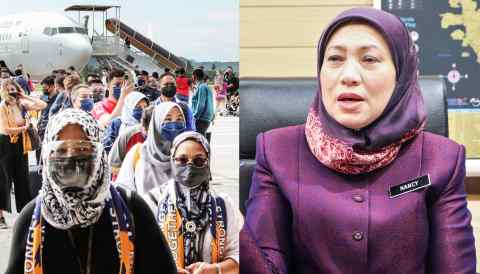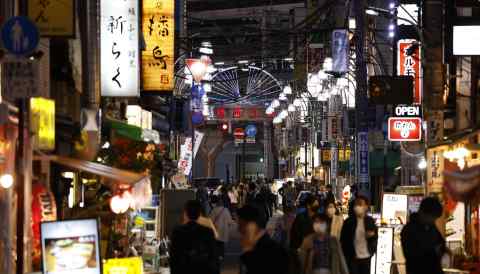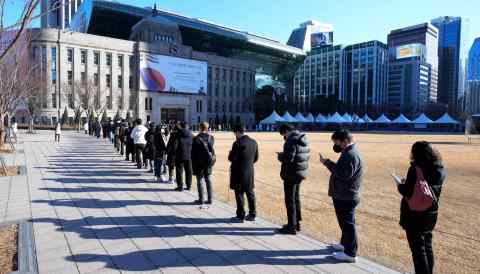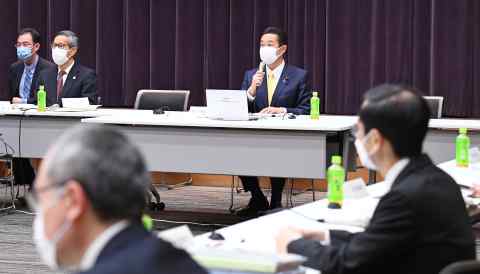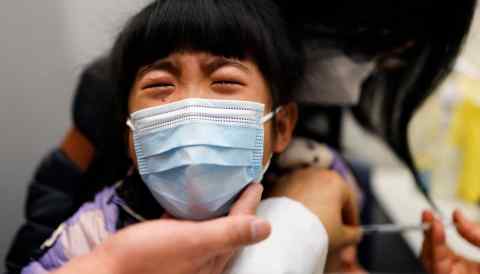
Nikkei Asia is tracking the spread of the coronavirus that was first detected in the central Chinese city of Wuhan.
Cumulative global cases have reached 246,011,396, according to Johns Hopkins University in Baltimore. The worldwide death toll has hit 4,988,983.
For more information about the spread of COVID-19 and vaccination progress around the world, please see our interactive charts and maps.
-- Global coronavirus tracker charts
-- Status of vaccinations around the world
-- World map of spreading mutated strains
-- Distribution, duration, safety: challenges emerge in vaccine race
----
UPDATES CLOSED
Saturday, Oct. 30 (Tokyo time)
11:50 a.m. Mainland China finds the most daily local infections in more than six weeks as it battles an outbreak concentrated mainly in its northern provinces, Reuters reports. China counted 59 new local transmissions for Friday, the National Health Commission says, up from 48 a day earlier. It was the highest number of new local infections since Sept. 16. Cases are being reported in Heilongjiang, Inner Mongolia, Gansu, Beijing and Ningxia. Including imported infections, China counted 78 new cases for Friday, up from 64 a day earlier.
5:30 a.m. The U.S. Food and Drug Administration has allowed emergency use of the Pfizer-BioNTech vaccine, this time for children aged 5 to 11. It is the first COVID-19 shot to receive the green light from the FDA for this age group, many members of which are back in school for in-person learning.
They will receive a 10-microgram dose of the vaccine -- just as third as large as the shot for those 12 and older. Pfizer plans to start shipping pediatric vials to pharmacies and doctors' offices.
12:11 a.m. Moderna says it will supply a further 56.5 million doses of its COVID-19 vaccine to the GAVI vaccine alliance in the second quarter of 2022 to low- and middle-income countries.
On top of a previous commitment for 60 million doses, this will bring the total for that quarter to 116.5 million.
GAVI and the World Health Organization both back the COVAX facility that has delivered some 400 million doses to 140-plus low- and middle-income countries, but several countries risk failing to meet WHO's target of 40% vaccination coverage by year-end, Reuters reports.
Friday, Oct. 29
6:00 p.m. Universal Studios' Beijing resort will enter "emergency pandemic prevention status," Chinese state media reports, citing the Beijing government, which also announced other measures to curb the spread of the COVID-19 virus. Xu Hejian, spokesman for the Beijing government, said at a briefing that the capital city would reduce the number of permitted wedding banquets and exhibitions, according to state broadcaster CCTV. The Universal Studios resort is 30% owned by U.S. media group Comcast's Universal Parks & Resorts and 70% by Chinese state-owned Beijing Shouhuan Cultural Tourism Investment.
3:59 p.m. ANA Holdings, the parent company of All Nippon Airways, has revised down its previously announced forecast of a net profit of 3.5 billion yen ($30 million) to a loss of 100 billion yen ($880 million) for the year through March 2022 as Japan's leading airline struggles to recover from the pandemic.
2:30 p.m. Malaysia plans to buy the Pfizer-BioNTech COVID-19 vaccine for children, after U.S. experts recommended the shot could be given to those aged 5 to 11. A panel of advisers to the U.S. Food and Drug Administration voted on Tuesday to recommend the authorization, saying the benefits of the vaccine outweigh the risks. The agency's decision is still pending. Malaysia's Health Minister Khairy Jamaluddin said on Twitter that other options, such as the shot from China's Sinovac BioTech, would also be considered to ensure schools reopen safely.
1:48 p.m. India reports 14,348 new cases, down from 16,156 the previous day, pushing the country's total to 34.25 million. Deaths jumped to 805 from 733 a day ago, bringing the total number of fatalities to 457,191. The country's daily positivity rate -- the number of positive cases per 100 tests -- stands at 1.12% and has remained below 2% for the past 25 days, according to the health ministry. With the 7.43 million vaccine doses India has administered since Thursday morning, the number of cumulative shots stands at 1.05 billion.
11:00 a.m. South Korea says it will drop all operating-hour curbs on restaurants and cafes and implement its first vaccine passport for high-risk venues such as gyms, saunas and bars as it tries to "live with COVID-19." The first phase will take effect on Monday and last a month, with plans calling for all restrictions to be scrapped by February.
10:30 a.m. Starbucks missed market estimates for quarterly same-store sales in the July-September period as a COVID-19 resurgence in China closed shops in several major cities and overshadowed a strong performance by its U.S. business. Fresh lockdowns to curb the spread of the delta variant in Starbucks' largest growth market have also hit several other restaurant chains, including Yum China Holdings. The coffee chain posted a 7% decline in China comparable sales in its fourth quarter, missing its forecast of roughly flat growth and offsetting a 22% jump in the U.S.
9:50 a.m. Australian retail sales rebounded in September from three months of steep declines as some easing in coronavirus restrictions helped steady spending, setting the scene for a lasting recovery now that lockdowns are mostly over. Data from the Australian Bureau of Statistics shows retail sales rose 1.3% in September from August, when they slid 1.7%. That handily beat forecasts of a 0.2% gain.
9:30 a.m. Japan's factory output slumped 5.4% in September from the previous month, shrinking for the third straight month as production in the auto sector was hit by a pandemic-induced global supply shortage, government data shows. Output disruptions across Asia and slowing growth in China have clouded the outlook for Japan's economy, which has depended heavily on exports to boost growth as the COVID-19 pandemic hurt domestic demand.
Thursday, Oct. 28
11:45p.m. The World Health Organization asks for $23.4 billion to fund its COVID-19 accelerator over the next year, which it says will expedite the development, production and equitable access to tests, treatments and vaccines.
The program will "help prevent at least 5 million potential additional deaths, save the global economy more than $5.3 trillion, and accelerate the end of the pandemic everywhere," the WHO says in a statement. The money would fund the project through September next year.
6:00 p.m. Russia reports 1,159 COVID-19 deaths for the past 24 hours, a fresh all-time high, amid a surge in new cases. The country also reports 40,096 new infections, compared with 36,582 a day earlier. Russia will go into a nationwide workplace shutdown in the first week of November, but Moscow on Thursday reimposed its strictest lockdown, with only essential shops like pharmacies and supermarkets allowed to remain open.
5:58 p.m. Hong Kong advises everyone who has received two jabs of China's Sinovac vaccine to get a BioNTech booster. The panel of medical experts advising the government also said that those at higher risk of infection and the elderly should receive a booster. About 68% of the city has received at least one dose of a vaccine. Recovered patients are now required to undergo a 14-day quarantine after being discharged from the hospital. Hong Kong has experienced no local infections for 20 days.
4:00 p.m. Toyota says its global sales fell by 16.4% in September from a year earlier to about 700,000 vehicles, the first decline in 13 months. The Japanese automaker has been cutting production since August due to difficulties in securing parts from Southeast Asia as the delta variant of COVID-19 hit the region. Toyota's global production fell 39.1% to 512,000 vehicles in September, the second consecutive month of year-on-year declines.
1:59 p.m. India reports 16,156 new cases in the last 24 hours, up from 13,451 the previous day, pushing the country's total to 34.23 million. Deaths rose from 585 a day ago to 733, bringing the total number of fatalities to 456,386. Meanwhile, the country administered nearly 5 million vaccine doses since Wednesday morning. With this, India's cumulative vaccination coverage has crossed 1.04 billion doses.
12:00 p.m. Australia eases its COVID-related travel advice for several countries, including the United States, Britain and Canada, as it prepares to reopen its borders next week for the first time in over 18 months. Australia will lift its outbound travel ban for fully vaccinated residents from Nov. 1 following a strong uptake of COVID-19 vaccines as Sydney and Melbourne, its biggest cities, look to welcome overseas travelers without quarantine. "The changes announced today are a vital next step in reuniting Australian families and safely reopening Australia to the world," Foreign Affairs Minister Marise Payne says.
11:56 a.m. The Bank of Japan has trimmed its growth forecast for the current fiscal year after COVID-19 disruptions forced automakers to slash production amid a shortage of microchips and other key parts. In its quarterly outlook, the central bank estimates economic growth at 3.4% for the fiscal year ending next March, compared with the 3.8% touted in July. Coronavirus outbreaks in countries such as Malaysia and Vietnam have overshadowed semiconductor supply chains, sparking drops in output of 30% to 40% in Japan's key auto sector over the September-October period.
11:46 a.m. Japan's leading COVID-19 adviser calls for a cautious approach in reopening the country's border, despite the global trend to relax entry restrictions amid progress in vaccination coverage. "There are still many countries in the world with many cases of infections," Shigeru Omi, an immunologist who heads the government's subcommittee on COVID-19 response, told Nikkei Asia in an interview as he attended the two-day Nikkei FT Communicable Diseases Conference in Tokyo. "Other viruses come in if you suddenly loosen border control measures, so [we need to] watch carefully and [take steps] little by little."
11:00 a.m. New Zealand says it will ease coronavirus border restrictions that have been in place since March 2020 and move to a system of home isolation for fully vaccinated overseas arrivals from early next year. The country was the among the first to shut down its borders last year and has retained these tough restrictions -- leaving many expatriate citizens and residents stranded for months. Fully vaccinated overseas travelers will spend only seven days in state quarantine facilities from Nov. 14, half of the current requirement.
9:00 a.m. Singapore's health ministry says it is looking into an "unusual surge" in infections after the city-state reported 5,324 new cases of COVID-19 on Wednesday, the most since the beginning of the pandemic. Singapore also recorded 10 new deaths on Wednesday, taking the toll to 349. "The infection numbers are unusually high today, mostly due to many COVID-positive cases detected by the testing laboratories within a few hours in the afternoon," the ministry said.
4:00 a.m. China is ramping up its push to end a coronavirus outbreak with less than 100 days until the Winter Olympics in Beijing, an event President Xi Jinping considers a key steppingstone toward solidifying a rare third term as leader.
Construction on the Guangzhou International Health Station, China's first dedicated quarantine facility for arrivals from overseas, began in June. The buildings themselves were mostly completed in September, with the work now focusing on roads and other features.
Wednesday, Oct. 27
11:00 p.m. Japanese vaccine makers are racing to release COVID vaccines next year as they anticipate new virus variants and further outbreaks.
KM Biologics, a Meiji Holdings subsidiary, said it is aiming for the release of its inactivated vaccine for use as booster shots next year. The Kumamoto-based company began a Phase 2-3 trial last week. Read more.
10:11 p.m. Merck signs a licensing agreement with the United Nations-backed Medicines Patent Pool that will allow more companies to manufacture generic versions of its experimental oral antiviral COVID-19 treatment.
9:34 p.m. Pfizer is in talks with Japan to apply for approval to administer its COVID-19 vaccine to children ages 5 to 11, reports Kyodo, citing sources close to the matter.
6:56 p.m. The Philippines will receive 300,000 courses of Merck & Co.'s COVID-19 antiviral drug next month, according to media reports citing a joint statement by MedEthix, a Philippine health care products importer, and distributer JackPharma. Asian nations are racing to get early access to the experimental pill amid huge demand.
1:13 p.m. With 100 days until the start of the Winter Olympics, Beijing is promising a "simple and safe" 2022 Games. Beijing will be the first city to stage both the Summer and Winter Games, but the 2022 event is shadowed by the coronavirus pandemic and calls from human rights groups for a boycott over China's treatment of Tibet, Uyghur Muslims and Hong Kong.
11:16 a.m. The premier of the Australian state of Victoria, Daniel Andrews, said his government will not apply for travel permits to allow unvaccinated tennis players to compete at the Australian Open after Prime Minister Scott Morrison indicated they would be allowed into the country, Morrison said earlier on Wednesday that unvaccinated players would be free to compete at the Grand Slam after a two-week COVID-19 quarantine, provided that Victoria, which hosts the tournament in Melbourne, applied for permits for them. Andrews said his state would make no such applications.
9:08 a.m. The U.S. state of Louisiana is ending its indoor mask mandate, except for K-12 schools, because of declining new cases of COVID-19, Gov. John Bel Edwards said Tuesday.
8:10 a.m. All fully-vaccinated Australian citizens and permanent residents will be able to leave the country without a special exemption from Nov. 1. Australians have been unable to travel abroad for more than 18 months without a government waiver, while thousands of fully vaccinated residents living abroad have been unable to return due to a cap on arrivals to slow the spread of COVID-19. "The national plan is working ... (it) is about opening Australia up and that is because the vaccination rates are climbing so high," Prime Minister Scott Morrison told Seven News.
5:24 a.m. An expert panel votes overwhelmingly to recommend the U.S. Food and Drug Administration authorize the Pfizer/BioNTech COVID-19 vaccine for children aged five to 11, saying the benefits of inoculation outweigh the risks. The FDA is not obligated to follow the advice of its outside experts, but usually does. The vaccine could be available to the younger age group as soon as next week.
Tuesday, Oct. 26
11:49 p.m. BioNTech signs an agreement with the Rwandan government and Institut Pasteur de Dakar in Senegal on the construction of the first mRNA vaccine manufacturing facility in Africa starting in mid-2022, to help the continent ease health inequalities compared with other world regions, reports Reuters.
BioNTech, which developed the western world's most widely used COVID-19 shots with partner Pfizer, will initially build a production line with an annual capacity of 50 million doses that could be used to make vaccines for such diseases as malaria and tuberculosis as well as for COVID-19, the company said.
6:15 p.m. Singapore announces the inclusion of Australia and Switzerland in its Vaccinated Travel Lane scheme, which allows passengers to fly in from selected countries without the need for quarantine. Fully vaccinated travelers from Australia and Switzerland can enter Singapore from Nov. 8, subject to virus testing. The city-state has already included countries like Brunei, Germany, Canada, Denmark, France, Italy, the Netherlands, Spain, the U.K. and U.S. under the scheme, as it moves to revive air travel and rebuild the country's position as an international hub.
5:00 p.m. India's health minister says that a government panel of experts is looking into a delta coronavirus subvariant, AY.4.2, that has been detected in the United Kingdom. The U.K. Health Security Agency said last week that it was investigating AY.4.2 as it was possibly more transmissible than delta, although there was no evidence that it caused more severe disease or rendered vaccines ineffective.
4:20 p.m. China is demanding faster and more accessible COVID-19 testing services in its latest effort to reinforce a zero-tolerance policy against the virus, even when cities have already scrambled to test millions in just a few days amid outbreaks. Frequent testing, and sometimes mass testing, has been standard practice in China's containment of outbreaks in the past year, but health authorities say testing services remain unsatisfactory in parts of China amid flare-ups. "Small clusters and sporadic infections have occurred in some areas, exposing problems such as the unreasonable locations of nucleic acid testing agencies, inconvenient services and delays in the returning of results," state media reported, citing the National Health Commission.
2:00 p.m. Hong Kong will soon scrap most of its quarantine exemptions for overseas and mainland travelers, Chief Executive Carrie Lam says. The exemptions allow people in certain industries, including executives from financial companies, to enter Hong Kong without a compulsory quarantine of up to 21 days. Lam said Hong Kong's measures must be more consistent with the mainland's to improve chances of China allowing more cross-border travel while dismissing a living with COVID strategy that other financial centers have undertaken. The announcement comes a day after an industry group says the city's zero-COVID policy undermines its financial hub status.
11:50 a.m. Japan's new daily infections fall below the 200 mark for the first time in 16 months, since early July last year, as nearly 70% of the entire population has been fully vaccinated. Japan reported a total of 153 new cases for Monday, down from 234 a day earlier. The government lifted restrictions on eateries on operating hours in Tokyo and other areas on Monday because cases have eased.
11:00 a.m. Facebook and YouTube have removed a video by Brazilian President Jair Bolsonaro in which the far-right leader made a false claim that COVID-19 vaccines were linked with developing AIDS. Both Facebook and YouTube parent company Alphabet said the video, recorded on Oct. 21, violated their policies. "Our policies don't allow claims that COVID-19 vaccines kill or seriously harm people," a Facebook spokesperson said in a statement.
9:30 a.m. SK Hynix forecasts steady growth in demand for memory chips as the South Korean chipmaker posts its highest quarterly operating profit since 2018 on the back of rising prices, which offset slowing personal computer sales as COVID-19 lockdowns eased.
9:10 a.m. South Korea's economic growth slowed in the third quarter as subdued private consumption and weak construction and facility investment offset robust exports. Gross domestic product grew a seasonally adjusted 0.3%, central bank data shows, the slowest in five quarters and following a 0.8% rise in the second quarter. "The toughened social distancing measures and impacts from the heat wave and rising raw material prices that continued over the third quarter seem to have limited the recovery in domestic demand," Finance Minister Hong Nam-ki said.
4:02 a.m. U.S. President Joe Biden signs an order imposing new vaccine requirements for most foreign nationals traveling to the U.S. by air, the White House says. Travel restrictions in place since early 2020 that barred most non-U.S. citizens from traveling to the U.S. from places including China, India and much of Europe have been lifted. The order takes effect Nov. 8.
Biden's order says it is in the U.S. interest to "move away from the country restrictions" previously applied and to adopt an air travel policy that "relies primarily on vaccination" to advance the safe resumption of international air travel to the country.
The White House confirms that children under 18 are exempt from the new vaccine requirements, as are people with some medical issues. Nontourist travelers from about 50 countries with nationwide vaccination rates of less than 10% will likewise be eligible for exemption from the rules. Those receiving an exemption will generally need to be vaccinated if they plan to stay in the U.S. for more than 60 days.
Monday, Oct. 25
9:45 p.m. Moderna says its COVID-19 vaccine generated a strong immune response and was generally well-tolerated in children ages 6 to 11 years, citing interim data from a study.
The company says the data showed two 50-microgram doses of the vaccine, half the strength of the doses used in the vaccine given to adults, generated virus-neutralizing antibodies in children. The majority of side effects were mild or moderate in severity, it says.
6:30 p.m. China has decided to postpone the Oct. 31 Beijing marathon amid a resurgence of coronavirus infections, as the capital tightens its COVID restrictions, state-run media reports. Around 100 days before the Beijing Winter Olympics is due to start in February, the government under President Xi Jinping is restricting the movements of Chinese citizens and carrying out virus tests on those who live in high-risk areas under its zero COVID policy.
5:00 p.m. Tokyo, its three neighboring prefectures, and Osaka have lifted coronavirus restrictions on the operating hours of eateries, as the Japanese capital reports just 17 new cases, the lowest daily count this year.
Restaurants and bars in regions where infections were high had been banned from serving alcohol and were asked by the government to close by 8 p.m. under a state of emergency imposed in April. The restriction on alcohol was eased with the lifting of the emergency at the end of September. For Tokyo and Osaka eateries, this is the first time in 11 months that all restrictions have been totally lifted.
4:55 p.m. South Korea will donate 1 million doses of AstraZeneca's COVID-19 vaccine to Iran, the Korea Disease Control and Prevention Agency says.
1:04 p.m. A financial industry group warns that Hong Kong's zero-COVID policy and strict quarantine requirements for international travelers threaten to undermine the city's status as a financial hub. The Asia Securities Industry and Financial Markets Association said a survey of members showed 48% were contemplating moving staff or functions away from Hong Kong due to operational challenges, including uncertainty over when and how travel and quarantine restrictions will be lifted.
11:00 a.m. South Korea reports 1,190 new cases, down from 1,423 a day earlier, bringing the cumulative total to 353,089. Deaths rose by 7 to 2,773.
10:30 a.m. Indonesia will gradually reopen parts of the country where COVID-19 vaccination rates are above 70%, President Joko Widodo tells a Southeast Asian business forum. Jokowi, as the president is known, also said Southeast Asia should start loosening travel restrictions, including vaccinated lanes for inoculated arrivals with negative COVID-19 tests.
9:50 a.m. New Zealand reports 109 new locally acquired cases, the bulk of them in its largest city, Auckland, the second-worst day of daily infections since the pandemic began. The country over the weekend also reported the first community case of the virus in the South Island in nearly a year, a cause for further headache.
4:41 a.m. The U.S. has administered 413,645,478 doses of COVID-19 vaccines in the country, says the U.S. Centers for Disease Control and Prevention. The CDC tallies two-dose vaccines from Moderna and Pfizer-BioNTech, as well as Johnson & Johnson's one-shot vaccine.
4:11 a.m. Vaccines for children in the U.S. between the ages of 5 and 11 will "very likely" be available "within the first week or two of November," top U.S. infectious disease expert Anthony Fauci says.
U.S. Food and Drug Administration officials are reviewing the Pfizer/BioNTech application seeking authorization for its two-dose vaccine for the age group, with a panel of outside advisers due to advise the agency on Oct. 26.
Sunday, Oct. 24
8:57 p.m. A Chinese health official says the nation's latest COVID-19 outbreak is increasingly likely to spread further, Reuters reports. More than 100 locally transmitted cases have been confirmed over the last week across 11 provincial areas. With the situation worsening, authorities urge all regions to escalate monitoring and call for a reduction in travel across provinces.
China reported 26 new locally transmitted cases on Saturday, according to the National Health Commission. As of Oct. 23, the country has administered over 2.24 billion doses of COVID-19 vaccines.
7:21 p.m. Israel and the United Arab Emirates have signed a "green corridor" agreement allowing passengers vaccinated against the novel coronavirus to travel freely between the two countries, the Israeli consulate in Dubai says on Twitter.
2:13 a.m. The U.K. records the highest number of new cases since July over the past week, government figures show, a day after Prime Minister Boris Johnson played down the prospect of a return to lockdown. Some 333,465 people in Britain tested positive for COVID-19 over the past seven days, up 15% on the previous week and the highest total since the seven days to July 21, Reuters reports.
12:25 a.m. Singapore's Health Ministry detects 3,598 new cases and six deaths, compared with 3,637 infections the previous day. Out of Saturday's new cases, 2,804 are recorded in the community while 790 are from migrant worker dormitories and four cases are imported.
Saturday, Oct. 23
7:57 p.m. Singapore's government is ramping up pressure on residents who are yet to get jabs against COVID-19, saying people will be barred from their workplaces from the start of next year unless they are fully vaccinated or can show negative test results. The city-state joins some Western jurisdictions that are shifting to workplace vaccine mandates, a trend that could spread into Asian countries as vaccination rates rise in the region.
6:42 p.m. South Korea says it has achieved its goal of vaccinating 70% of its 52 million people, paving the way for a planned return to normal next month. The target, set a month before the country kicked off its inoculation campaign in late February, was reached by 2 p.m., with some 36 million vaccinated, said the Korea Disease Control and Prevention Agency.
12:28 p.m. New Zealand reports 104 new coronavirus infections, including the first community case of the virus in the country's South Island in nearly a year, health officials say. Most of the new infections were reported in Auckland, New Zealand's largest city that has been under a strict lockdown for more than two months. Looser restrictions are in place in most of the rest of the country of 5 million.
---
To catch up on earlier developments, see last week's latest updates.



















